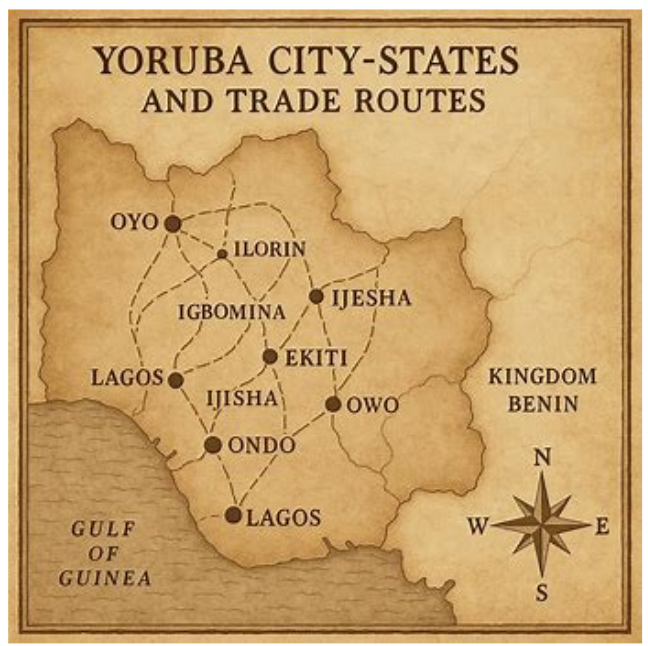The Yoruba people of southwestern Nigeria stand as one of Africa’s most influential civilisations, renowned for their political sophistication, vibrant artistic heritage, and enduring spiritual traditions. Centred around a network of autonomous city-states, their achievements in governance, religion, and culture shaped West African history and continue to influence global communities today.
Origins of the Yoruba City-States
The origins of the Yoruba civilisation lie at the crossroads of oral tradition and historical evidence. Oral accounts trace Yoruba ancestry to Oduduwa, a revered progenitor who is said to have founded Ile-Ife, the spiritual heart of the Yoruba world. While Oduduwa remains a largely mythical figure, archaeological and historical evidence shows that Ile-Ife flourished as a major urban centre from around the 11th century CE, producing some of the most sophisticated art in Africa (Blier, 2012).
Geographically, the Yoruba inhabited fertile lands stretching from the Niger River basin to the Atlantic coast. This environment encouraged agricultural surplus, long-distance trade, and population growth. Over centuries, independent yet culturally interconnected city-states developed, each governed by a king (Oba) and supported by councils of chiefs.
Structure and Political Organisation
The Yoruba city-states functioned as autonomous polities, with major centres including:
- Ife – regarded as the spiritual capital and seat of kingship traditions.
- Oyo – the largest and most militarily powerful state, noted for its cavalry and administrative system.
- Ijebu – a wealthy trading hub that controlled access to coastal markets.
- Ekiti, Ondo, Ijesha, and Egba kingdoms – important regional states with agricultural and cultural influence.
Despite their independence, the Yoruba shared a common language, religious practices centred on the Orisha pantheon, and political traditions that emphasised checks on royal power. Councils such as the Oyo Mesi in Oyo and the Iwarefa in Ife ensured balance between monarchy and aristocracy.
EXPLORE: Nigerian Civil War
Alliances and Interactions
Religious Cohesion
Ile-Ife’s central role in Yoruba kingship and religion provided a powerful spiritual anchor. Pilgrimages, festivals, and rituals fostered a shared sense of identity, even in times of political rivalry.
Military Cooperation
Facing external threats such as incursions from the Nupe in the north or the Dahomey Kingdom in the west, Yoruba states occasionally formed military coalitions. The Oyo Empire, at its peak in the 17th–18th centuries, extended influence through both warfare and tributary alliances.
Trade and Economic Networks
Commerce played a vital role in linking Yoruba states. Agricultural produce, kola nuts, textiles, and imported goods moved along well-established routes. The Ijebu acted as crucial middlemen, controlling trade between inland towns and coastal markets. Alliances often arose from mutual commercial interests, particularly during the Atlantic trade era.

Key Historical Figures and Events
- Oranmiyan – traditionally credited as a founder of Oyo, remembered for expanding Yoruba political influence.
- Alaafin Abiodun (r. 1774–1789) – under his reign, Oyo reached a period of relative peace and prosperity, strengthening alliances through diplomacy rather than excessive warfare.
- The Ijebu Trade Monopoly – in the 18th and 19th centuries, Ijebu leaders leveraged geography to dominate trade routes, forging economic partnerships with inland states.
Cultural Achievements
Art and Sculpture
Between the 12th and 15th centuries, Ile-Ife produced naturalistic terracotta and bronze sculptures, regarded as some of the greatest achievements of African art (Willet, 2004). These works reflected religious devotion and political authority. Other states contributed woodcarving, beadwork, and textiles, embedding symbolism in material culture.
Religion and Philosophy
The Yoruba spiritual system revolved around the worship of Orisha deities, governed by the supreme god Olodumare. The concept of Ase (spiritual life-force) and the divination system of Ifa informed governance, conflict resolution, and personal life. These traditions spread across the Atlantic during the slave trade, shaping religions such as Santería in Cuba and Candomblé in Brazil.
Oral Tradition and Literature
Yoruba culture preserved history through oral poetry, praise chants (oriki), and folktales. These narratives recorded genealogies, celebrated rulers, and reinforced moral codes, ensuring cultural continuity across generations.
Decline and Colonial Disruption
Despite moments of unity, Yoruba alliances were often fragile. By the early 19th century, succession disputes, economic competition, and the decline of Oyo triggered decades of conflict known as the Yoruba Civil Wars (c.1820s–1890s).
- Ibadan rose as a new military power, dominating regional politics.
- The collapse of Oyo disrupted trade, weakening inter-city cooperation.
- British colonial expansion in the late 19th century imposed artificial boundaries and restructured governance, effectively ending the autonomy of Yoruba city-states.
Legacy and Contemporary Relevance
Today, Yoruba heritage remains vibrant. Cities such as Lagos, Ibadan, Oyo, and Ile-Ife continue to celebrate festivals, maintain chieftaincy traditions, and preserve oral history. Globally, Yoruba spirituality, language, and art resonate across diasporic communities in the Americas, where enslaved Africans carried their traditions.
Conclusion
The Yoruba city-states exemplify a model of African urban civilisation marked by political sophistication, rich culture, and resilient diplomacy. Though fragmented by rivalry and later undermined by colonialism, their legacy endures in art, religion, governance, and identity. The Yoruba story illustrates the complexities of African statecraft while demonstrating the cultural achievements that continue to inspire both within Nigeria and across the world.
Author’s Note
This article explores the history of Yoruba city-states, tracing their political organisation, alliances, cultural achievements, and eventual decline under colonial pressures. It highlights the interplay between unity and rivalry while underscoring the enduring significance of Yoruba contributions to African and global history.
References
- Blier, S. P. (2012). Art and Risk in Ancient Yoruba: Ife History, Power, and Identity, c.1300. Cambridge University Press.
- Willet, F. (2004). African Art: An Introduction. Thames & Hudson.
- Law, R. (1977). The Oyo Empire, c.1600–1836: A West African Imperialism in the Era of the Atlantic Slave Trade. Oxford University Press.

